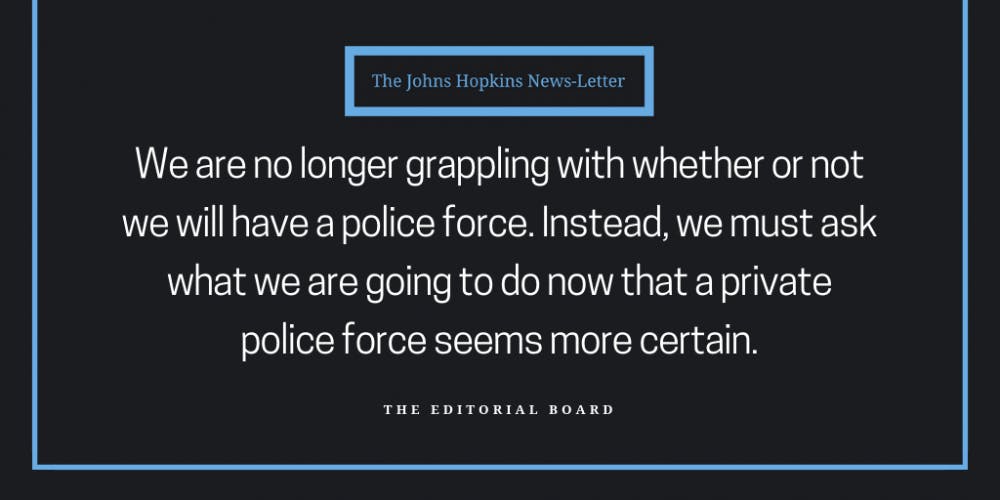Since the University first announced its intent to create a private police force in March 2018, the Editorial Board has opposed the initiative. Now the bill – called the Community Safety and Strengthening Act – has passed in the Maryland General Assembly, and we maintain our opposition. We are disappointed that this bill is moving forward and we have the same concerns about a Hopkins police force that we have already expressed over the past year: a continuation of corrupt policing in Baltimore, potential racial profiling of students, the threat of armed guards on campus and further division between the Hopkins and Baltimore communities.
University officials lost our trust when they first announced the bill without consulting Hopkins affiliates or our surrounding community. They only chose to postpone the legislation after facing overwhelming pushback from Hopkins students and faculty alongside Baltimore community members. They failed to restore our trust over the past year because they’ve only done the bare minimum to hear student voices and — for the most part — failed to act on them. Though the University has held several forums and panels to solicit feedback, many attendees told The News-Letter that they felt as though the administration did not take their concerns seriously.
For these reasons, we appreciate that the most vocal opposition to the police force has refused to stand down. As of press time, students have been sitting in Garland Hall for over 175 hours. It is more imperative than ever that we continue to hold the University accountable over the next few months.
In some ways, the sit-in has been an effective way of doing just that. Over the past week it has drawn the attention of local publications, including the Baltimore Sun, the Baltimore Beat and the Baltimore Fishbowl. It has also drawn national attention: Organizers at other institutions such as the University of Chicago and Northwestern University have stood in solidarity with the demonstration, which has also made national headlines. Activists at Hopkins have also used the timing of the sit-in to their advantage, interrupting an Alumni Weekend breakfast with University President Ronald J. Daniels and demonstrating at the Rec Center in front of admitted students during SOHOP.
Activists have continued to oppose a police force in any form, and as of now they seem unwilling to compromise on that demand. We admire the unwavering stance they have taken since the bill was first announced last spring. Ideally, we would not need a compromise. Ideally, we would not be getting a private police force at all. It seems unlikely, however, that Hopkins administrators or state legislators will choose to back down from their decision. The Maryland General Assembly has already passed the bill. At this point, we must question how activists can adapt their demands.
Vocal and steadfast opposition was absolutely crucial when Hopkins first announced the initiative and when the University was revising the bill. But it’s clear to us that categorical opposition is no longer the most productive way to hold the University accountable. We are no longer grappling with whether or not we will have a police force. Instead, we must ask what we are going to do now that a private police force seems more certain.
We understand why activists may be slow to change their strategy. To them, it may be tantamount to giving up, to letting the University move forward with its bill without repercussions. But if we do not shift the conversation now, we will be less prepared to hold the University accountable in the coming months.
We commend activists for how tirelessly they’ve stood for student and community interests, but it’s imperative that they are vocal about how to implement a private police force that has the potential to align with our values: one that is trained not to racially profile; one that is accountable to students and community members; and one that we can trust to prevent crime without resorting to brute violence.
Activists have demanded a place in this conversation from day one. The first draft of the legislation would have handed Hopkins a blank cheque with no specific measures to increase the force’s accountability. Today’s bill is, in President Daniels’ words, “a detailed code of regulation that describes a whole lot about how that force will operate.” Those who oppose the bill have shown that they can effect real change. In the coming months, the University will establish a memorandum of understanding with the Baltimore Police Department. We hope that activists are willing to negotiate further so that they don’t lose a valuable seat at the table.
We also hope to hear more moderate voices in the discussion. Some protesters assume that the overwhelming majority of students share their views, but this is not necessarily the case. We have not heard enough from students who may be uncomfortable with a police force, but who still have concrete ideas about how to make sure it suits community interests. For example, students who have been victims of crime in the vicinity may have ideas about how we can improve safety without hurting members of our community.
That being said, we admire the measures that activists have taken to make the sit-in more inclusive. Signs welcome people across the gender spectrum, as well as participants who may not be able to stay at the sit-in for long. We respect that the organizers have accommodated community members. And of course, we respect that the activists have sacrificed so many hours of studying, rest and sleep to make their voices heard.
But if activists want to galvanize their platform, they must think beyond the demands they’ve reiterated consistently over the past year. We have reached a stalemate, and activists must start thinking about how their opposition can shape the private police moving forward. Will they demand a high standard that reflects what we might hope to see from an exemplary force? Or will they refuse to compromise any further?





